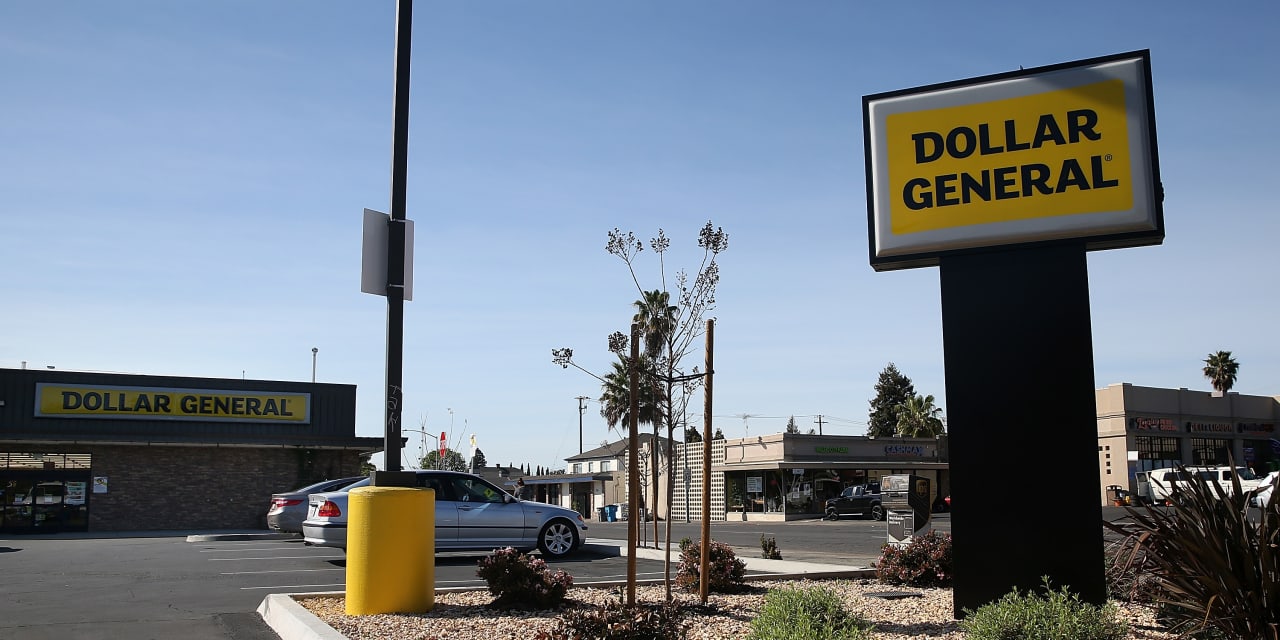The biggest takeaway from retail earnings season is that consumers are doubling down on value in face of rising economic pressure.
You wouldn’t know it from
Dollar General
and
Dollar Tree
‘s recent quarterly results—or their share prices.
Dollar General
‘s stock tumbled 14% on Thursday after the discount retailer reported weaker results than expected and cut its financial forecasts for the fiscal year.
Dollar Tree
beat expectations and raised its forecasts a little, but the stock fell close to 10% last week as the company warned that consumer demand was slowing and that increasing theft is hitting its profit.
Shares of Dollar General and Dollar Tree are off 45% and 14% this year, respectively.
Dollar General
(ticker: DG) reported earnings of $2.13 a share from revenue of $9.8 billion. Analysts surveyed by FactSet were expecting the retailer to report earnings of $2.47 a share from sales of $9.9 billion. Same-store sales decreased 0.1% from the first quarter of 2022, driven by a decline in customer traffic.
The lackluster results are especially surprising given that other value-focused retailers, including
Walmart
(WMT) and
TJX Cos.
(TJX), have thrived as shoppers seek to stretch their budgets in response to inflation and high interest rates.
Why, then, have dollar stores failed to reap those benefits? To Jefferies analyst Corey Tarlowe, it comes down to a mix of company-specific and macroeconomic challenges.
“They have some operational hurdles that they’re in the midst of overcoming, and it’s hindered results a little bit,” he told Barron’s.
Both Dollar General and Dollar Tree are in the early stages of new investment strategies, including spending on higher wages, store remodeling, supply-chain improvements, and efforts to fight theft. Other competitors, including
Walmart,
are further along in their investment cycles, he said.
Dollar General slashed its fiscal 2023 outlook on Thursday, partially because of the investments it is undertaking. These investments will present a drag of up to $170 million on operating profit in the second half of 2023. Net sales will grow between 1.3% and 3.3% in fiscal 2023, compared with previous guidance of 3.3% to 5%. Management also expects earnings to decline between 22% and 34% in the year, compared with a previous call for profit to be flat to 8% lower.
“We thought there was a risk that DG would need to invest more in stores than [management] initially expected, and reduce guidance as a result, but this is a much bigger cut than we (and the market) were expecting,” wrote Citi analyst Paul Lejuez in a research note.
Dollar stores have also been plagued by rising levels of so-called inventory shrink, the industry term that refers to merchandise theft and damage. Dollar General and Dollar Tree both said shrink pressured profits this quarter. Profit as a percentage of Dollar General’s net sales was 31.1%, down from 32.3% a year ago. Dollar Tree’s gross margins fell 2.2 percentage points in its latest quarter.
From an economic perspective, higher interest rates, rising inflation, lower tax refunds, and the termination of economic stimulus payments are weighing on lower-income consumers, Tarlowe said. That has led to fewer store visits and purchases, the company said.
“Our core customers continue to tell us they feel financially constrained,” Dollar General CEO Jeff Owen said on a call with investors
As a result, customers are spending less on things they don’t have to have, while prioritizing necessities. This quarter, Dollar General said shoppers bought more food and other essentials, which are less profitable than discretionary goods such as apparel and items for the home.
What is more, the selection of food available at dollar stores tends to be more limited than at grocery stores or big-box retailers. Dollar stores’ main advantage is that prices can be cheaper, but in recent quarters, that hasn’t always been the case, Tarlowe said. Walmart, for instance, has been selling seasonal products at last year’s prices to reduce the impact of inflation.
Dollar General’s report earned the stock a downgrade on Thursday. Oppenheimer analyst Rupesh Parikh lowered his rating to Perform from Outperform, and removed his target of $195 for the price.
“The outlook for DG likely remains difficult in the current competitive/macro landscape,” he wrote in a note to clients. “We believe shares likely continue to trade at depressed valuations vs. recent history.”
Write to Angela Palumbo at [email protected]
Read the full article here





